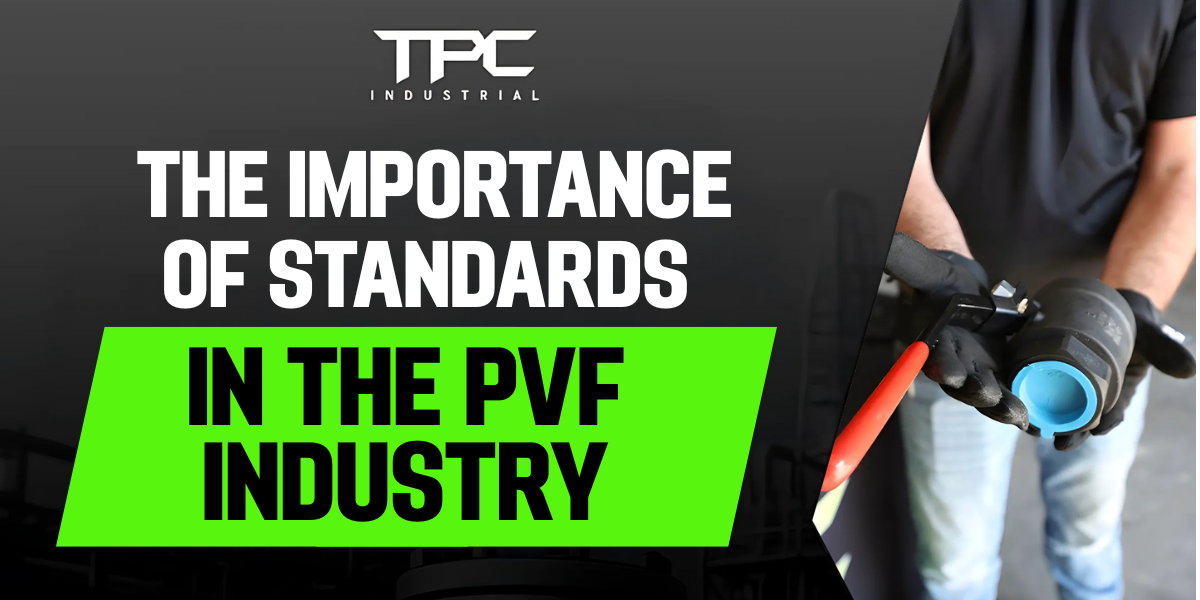PVF components operate in demanding environments—high heat, high pressure, corrosive fluids, or volatile gases. These aren’t the kinds of systems where “close enough” is good enough. The industry depends on strict standards to ensure every part is built to handle what it’s exposed to.
TPC Industrial Guarantees Standards Compliance
If your project runs on pipe, valves, or fittings, there’s no room for guesswork. Pressure ratings matter. Materials matter. Certifications matter. And when a spec is off or a part can’t be traced, the cost isn’t just a delay—it’s a liability.
At TPC Industrial, we’ve seen what happens when contractors are let down by suppliers who cut corners. That’s why we don’t just sell PVF—we supply peace of mind. Whether you’re working in oil and gas, refining, midstream, or industrial construction, you deserve products that meet spec, pass inspection, and perform under pressure. We make sure that happens.
Who Sets PVF Standards?
Several organizations define the material grades, dimensions, and pressure tolerances for PVF components:
- ASTM International — Covers material composition and manufacturing standards (e.g., A106 carbon steel pipe).
- ASME — Publishes piping codes like B31.1 (Power Piping) and B31.3 (Process Piping).
- API — Sets performance expectations for pipeline and oilfield equipment.
- ANSI — Ensures consistent sizing and interoperability across manufacturers.
- MSS — Covers specifications for smaller or specialty items like forged fittings and pipe hangers.
Meeting these standards isn’t a luxury—it’s a requirement. That’s why inspectors ask for MTRs and QA teams check product markings. One uncertified elbow can stop an entire weld line. One wrong spec on a flange can void your pressure test.
What Can Go Wrong Without Certified Material?
If you’ve ever ordered from a general supply house or offshore vendor without proper documentation, you know how fast things can unravel.
- Project delays when inspectors reject a component for missing certification.
- Costly rework from non-compliant parts that don’t match spec.
- Safety risks when materials fail under load, temperature, or corrosion.
- Regulatory penalties or legal exposure due to failed pressure tests or pipe failures.
We’ve seen clients walk in the door after bad experiences elsewhere—where the flange was mismarked, the valve failed in the field, or the fitting didn’t meet the project’s ASME code. Our job is to make sure that never happens with our inventory.
Domestic vs. Imported Material: Know the Difference
We work with both domestic and imported mills—but we don’t treat them as interchangeable. There are times when only domestic material will pass inspection, especially under government or refinery contracts. Other times, quality imports can meet all necessary ASTM or ASME standards, providing real savings without compromise.
The difference is knowing which is which—and standing behind it.
At TPC, we help you choose the right source for your specs and deadlines, with no confusion, no half-truths, and no surprise substitutions.
How TPC Protects You From Spec Risk
Our team knows that our reputation is tied to what we ship—and what you install. That’s why we’ve built systems to protect your project before the first part leaves our yard.
We Only Stock What We Trust
Every flange, fitting, or valve that enters our warehouse is reviewed and vetted before we sell it. We know the certs, the source, and the standard it meets. If it’s not right, it doesn’t ship. Period.
Application Support From Industry Pros
Not sure if A234 WPB meets your process temp? Debating between a Class 150 and Class 300 flange? Our team understands how these specs translate in the real world—not just on paper. We’ll help you avoid over-engineering, under-spec’ing, or wasting time on rework.
Clear Answers, Not Confusion
We don’t pass the buck or hide behind confusing product codes. If you need a fitting that meets B16.9, you’ll get one that’s fully compliant—and labeled accordingly. If your job needs low-temp carbon, we’ll make sure it’s not swapped for a cheaper alternative.
Documentation When You Need It
We keep certifications, spec sheets, and mill test reports available when needed. That means when QA asks, you’re covered. No digging, no delay, and no calling five different people to get a traceable answer.
Why It’s More Important Now Than Ever
Supply chains are tighter. Tariffs are changing. Pressure to stay on schedule has never been higher. That’s why standards aren’t just for inspectors—they’re your first line of defense against delays and liability.
When materials are in short supply, some suppliers cut corners. Others stay silent when specs shift or codes change. At TPC, we double down on transparency. We’re in business to protect yours.
What You Risk With the Wrong PVF Supplier
There’s a cost to saving a few bucks on a flange. Or to choosing the lowest-bid vendor without vetting the material. If your supplier doesn’t know the codes—or doesn’t care—you’re the one who pays the price.
You could lose time. Fail an inspection. Or worse, face a mechanical failure on a live line. In this industry, those aren’t just mistakes. They’re risks no serious contractor can afford.
The TPC Industrial Standard
We don’t carry everything. We carry the right things. That’s how we’ve earned the trust of fabricators, field operators, and procurement managers across the Gulf Coast. Our entire model is built on accuracy, speed, and knowledge—and we only hire people who share that mindset.
When you call TPC, you’re getting more than a product. You’re getting a partner who understands why quality matters, and who stands behind what we ship.
Call TPC Industrial at (346) 226-3866 and talk to a team who knows the difference between “good enough” and what’s actually right for the job. We’re here to keep your operation moving—and make sure every part you install is up to code, every time.







